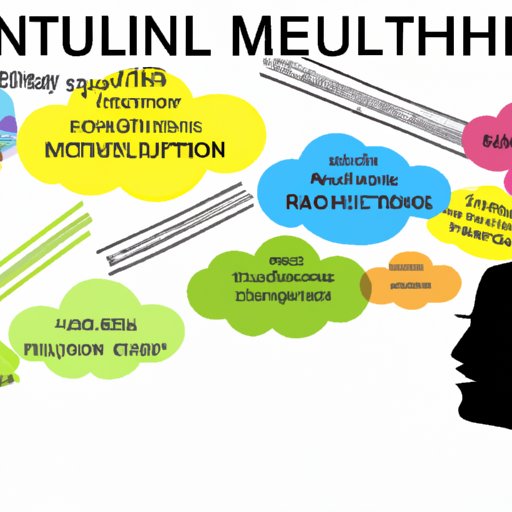Introduction
When asked to define “health”, many people would likely refer to physical wellbeing. While this is an important aspect of health, it is not the only one. Health is actually a holistic concept that encompasses multiple dimensions including physical, mental, social, and spiritual health. This article will explore what health really means and how we can promote and maintain it through good nutrition, regular exercise, quality sleep, and effective stress management.
Defining Health: Exploring the Meaning of Wellness
The World Health Organization defines health as “a state of complete physical, mental, and social well-being and not merely the absence of disease or infirmity.”1 This definition acknowledges that health is more than just the absence of illness; it is a state of wellbeing that encompasses all aspects of life. Let’s take a look at some of these components of health in more detail.
Physical Health
Physical health refers to the body’s ability to function properly. It involves maintaining the body’s strength, endurance, and flexibility. Good physical health also requires a healthy diet, regular exercise, and adequate rest.
Mental Health
Mental health is the ability to think, learn, and make decisions. It is also the capacity to cope with life’s challenges, manage stress, and build meaningful relationships. Mental health is closely linked to physical health and both are essential for overall wellbeing.
Social Health
Social health is the ability to interact effectively with others and form meaningful relationships. It involves building strong connections with family, friends, and colleagues. Social health is also about developing the skills to recognize and express emotions appropriately.
Spiritual Health
Spiritual health is the connection between one’s self and something larger than oneself. It is often associated with religious beliefs but can also include any practices that help to bring meaning and purpose to life. Spiritual health is closely linked to mental and emotional wellbeing.

The Impact of Nutrition on Mental and Physical Health
Nutrition plays a crucial role in promoting and maintaining health. Eating a balanced diet provides the body with the energy and nutrients it needs to function properly. A balanced diet should include a variety of foods from all food groups including fruits, vegetables, whole grains, proteins, and dairy.
Nutritional Requirements for Optimal Health
In order to meet the body’s nutritional needs, it is important to understand the recommended daily intake of specific nutrients such as vitamins, minerals, and essential fatty acids. The Dietary Reference Intake (DRI) provides guidelines for the recommended daily intakes of these nutrients.2 For example, the DRI recommends that adults consume 7 – 13 servings of fruits and vegetables per day, 6 – 11 servings of grains per day, and 3 – 7 servings of proteins per day.
Role of Vitamins and Minerals in Health Maintenance
Vitamins and minerals are essential for the body to function properly and for optimal health. Vitamins and minerals play an important role in metabolism, growth, development, and other bodily processes. They are found in a variety of foods including fruits, vegetables, legumes, grains, nuts, and dairy products.3
Benefits of Eating a Balanced Diet
Eating a balanced diet has numerous benefits for both mental and physical health. Eating a variety of nutrient-dense foods helps to boost immunity, improve mood, reduce stress, and maintain a healthy weight. In addition, eating a balanced diet can help to prevent chronic diseases such as heart disease, diabetes, and cancer.4

Understanding the Benefits of Exercise for Overall Health
Regular exercise is another important component of health. Exercise helps to maintain muscle strength and cardiovascular health, as well as improve mental health and overall wellbeing. Regular physical activity can also help to reduce the risk of certain chronic conditions such as heart disease, stroke, and type 2 diabetes.5
Benefits of Regular Exercise
There are numerous benefits to engaging in regular physical activity. Exercise helps to improve muscle strength and endurance, as well as flexibility. It can also reduce stress, increase energy levels, and improve mood. Regular exercise has also been shown to reduce the risk of certain chronic diseases and help to maintain a healthy weight.6
Types of Exercise for Optimal Health
In order to achieve optimal health, it is important to engage in a variety of different types of exercise. Aerobic exercise, such as running, swimming, and cycling, helps to improve cardiovascular health and endurance. Strength training, such as lifting weights, helps to build muscle and bone mass. Stretching exercises help to improve flexibility and mobility. Finally, balance exercises, such as yoga and tai chi, help to improve coordination and posture.7
Importance of Stretching for Flexibility and Injury Prevention
Stretching is an important part of any exercise routine. Stretching helps to improve flexibility, which can help to prevent injuries during physical activity. It can also help to improve circulation, relieve tension, and reduce stress. Stretching should be done before and after any type of physical activity.8

Sleep and Its Effects on Our Health
Getting adequate sleep is essential for both physical and mental health. Sleep allows the body to repair and regenerate itself and is necessary for proper brain function. It also helps to regulate hormones and improve mood. Unfortunately, many people do not get enough sleep due to busy lifestyles, stress, and other factors.
How Much Sleep is Necessary?
The amount of sleep an individual needs varies depending on age and lifestyle. Generally, adults should aim for 7 – 9 hours of quality sleep per night. Getting less than this can lead to fatigue, reduced concentration, and impaired decision-making.9
How Lack of Sleep Affects Health
Chronic lack of sleep can have a negative impact on both physical and mental health. It can lead to fatigue, depression, irritability, and difficulty concentrating. It can also increase the risk of obesity, heart disease, and diabetes.10
Strategies to Improve Sleep Quality
There are several strategies that can be used to promote better sleep. These include avoiding caffeine and alcohol before bed, establishing a regular sleep routine, avoiding screens before bed, and exercising regularly. Practicing relaxation techniques such as deep breathing and meditation can also help to improve sleep quality.11
Stress Management and Its Role in Maintaining Health
Stress is a normal part of life, but too much stress can have a negative impact on health. Stress has been linked to a wide range of physical and psychological issues including headaches, fatigue, anxiety, and depression. Therefore, it is important to manage stress in order to maintain overall health and wellbeing.
Recognizing the Signs of Stress
It is important to recognize the signs of stress in order to effectively manage it. Common signs of stress include changes in appetite, difficulty sleeping, irritability, and difficulty concentrating. It is also important to note that everyone reacts differently to stress and it is important to pay attention to your own reactions.
Coping Mechanisms for Dealing with Stress
There are many different coping mechanisms for dealing with stress. These include exercise, relaxation techniques, meditation, journaling, and talking to a friend or family member. It is important to find a technique that works best for you and practice it regularly.
Benefits of Stress Management Techniques
Managing stress can have numerous benefits for physical and mental health. It can help to reduce anxiety and depression, improve sleep quality, and boost immunity. It can also help to increase focus and productivity, and improve relationships with friends and family members.12
Conclusion
Health is a holistic concept that encompasses multiple dimensions including physical, mental, social, and spiritual health. Good nutrition, regular exercise, quality sleep, and stress management are all important components of health. Taking steps to promote and maintain these areas of health can lead to improved overall wellbeing.
In conclusion, health is more than just physical wellbeing. It is a complex concept that involves the body, mind, and spirit. By taking steps to promote and maintain good nutrition, regular exercise, quality sleep, and effective stress management, we can improve our overall health and wellbeing.
Summary of Key Points
This article explored the meaning of health and how it can be maintained through good nutrition, regular exercise, quality sleep, and stress management. Nutrition plays a crucial role in promoting and maintaining health, and it is important to understand the recommended daily intake of specific nutrients. Exercise helps to maintain muscle strength and cardiovascular health, as well as improve mental health and overall wellbeing. Quality sleep is essential for both physical and mental health, and it is recommended that adults get 7 – 9 hours of sleep per night. Stress management is also important for maintaining health, and there are a variety of coping mechanisms for dealing with stress.
Recommendations for Promoting and Maintaining Health
This article provided insight into what health means and how it can be promoted and maintained. Some recommendations for promoting and maintaining health include: eating a balanced diet, engaging in regular physical activity, getting adequate sleep, and managing stress. By taking steps to promote and maintain these areas of health, individuals can improve their overall wellbeing.
(Note: Is this article not meeting your expectations? Do you have knowledge or insights to share? Unlock new opportunities and expand your reach by joining our authors team. Click Registration to join us and share your expertise with our readers.)
